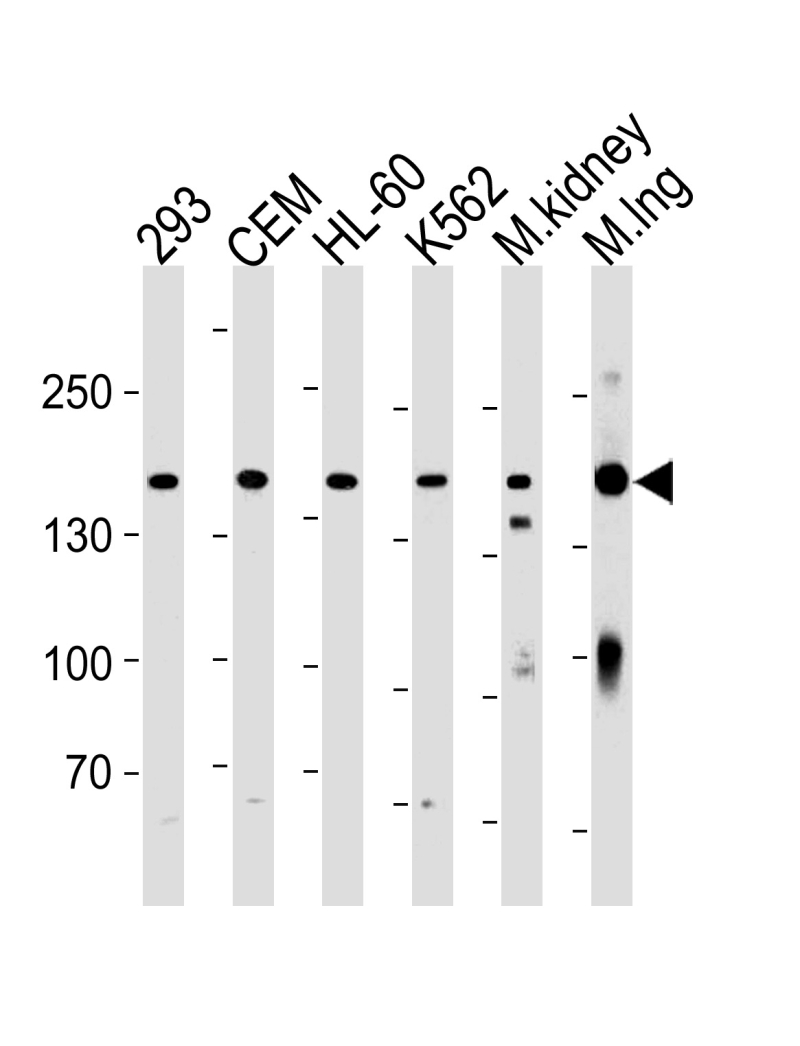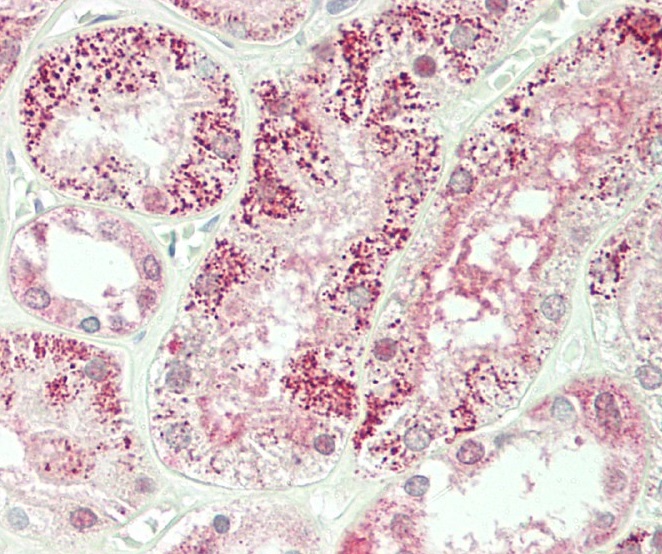

| WB | 1/1000 | Human,Mouse,Rat |
| IF | 咨询技术 | Human,Mouse,Rat |
| IHC | 1/100 | Human,Mouse,Rat |
| ICC | 技术咨询 | Human,Mouse,Rat |
| FCM | 咨询技术 | Human,Mouse,Rat |
| Elisa | 咨询技术 | Human,Mouse,Rat |
| Aliases | Plakophilin-4, p0071, PKP4 |
| Entrez GeneID | 8502 |
| WB Predicted band size | 131.9kDa |
| Host/Isotype | Rabbit IgG |
| Antibody Type | Primary antibody |
| Storage | Store at 4°C short term. Aliquot and store at -20°C long term. Avoid freeze/thaw cycles. |
| Species Reactivity | Human, Mouse |
| Immunogen | This PKP4 antibody is generated from rabbits immunized with a KLH conjugated synthetic peptide between 1040-1068 amino acids from the C-terminal region of human PKP4. |
| Formulation | Purified antibody in PBS with 0.05% sodium azide. |
+ +
以下是关于PKP4抗体的3篇参考文献示例(内容为模拟虚构,供参考):
---
1. **文献名称**:*Plakophilin-4 (PKP4) regulates cell-cell adhesion through desmosomal assembly in epithelial cells*
**作者**:Smith A, et al.
**摘要**:本研究利用PKP4特异性抗体,通过免疫荧光和Western blot技术,揭示了PKP4在维持上皮细胞桥粒结构和细胞间黏附中的关键作用。实验表明,PKP4缺失会导致细胞连接稳定性下降,并影响细胞极性。
---
2. **文献名称**:*PKP4 expression correlates with metastatic potential in colorectal cancer*
**作者**:Lee B, et al.
**摘要**:作者通过免疫组化(使用PKP4抗体)分析结直肠癌组织样本,发现PKP4在转移性肿瘤中表达显著下调,提示其可能作为抑制肿瘤侵袭的潜在标志物。研究进一步通过基因沉默验证了PKP4对癌细胞迁移的影响。
---
3. **文献名称**:*Interaction of PKP4 with Wnt signaling pathway components in neural development*
**作者**:Chen C, et al.
**摘要**:该研究利用PKP4抗体进行免疫共沉淀实验,发现PKP4与β-catenin等Wnt通路蛋白存在相互作用,表明其可能参与调控神经发育中的信号传导。实验在斑马鱼模型中证实PKP4缺失导致神经管闭合缺陷。
---
注:以上文献为示例性内容,实际引用需查询具体数据库(如PubMed)获取真实研究。若需精确文献,建议提供更具体的研究方向或实验背景。
Plakophilin-4 (PKP4), a member of the plakophilin family of armadillo-repeat proteins, is a critical component of cell-cell junctions, particularly desmosomes and adherens junctions. It plays a multifaceted role in maintaining epithelial and tissue integrity by mediating cytoskeletal interactions and stabilizing intercellular adhesion complexes. PKP4 is expressed in various tissues, including the skin, heart, and nervous system, and is involved in regulating cell signaling, polarity, and proliferation. Dysregulation of PKP4 has been linked to pathological conditions such as cancer, skin disorders, and cardiovascular diseases, where altered cell adhesion contributes to disease progression.
PKP4 antibodies are immunological tools developed to detect and study the expression, localization, and function of PKP4 in biological systems. These antibodies are widely used in techniques like immunohistochemistry (IHC), immunofluorescence (IF), and Western blotting to investigate PKP4’s role in normal physiology and disease. In cancer research, PKP4 antibodies help assess its potential as a biomarker, as PKP4 downregulation or mislocalization is observed in certain carcinomas. Additionally, studies utilizing PKP4 antibodies have explored its interaction with binding partners like desmoplakin and cadherins, shedding light on mechanisms underlying tissue fragility and metastasis. Commercially available PKP4 antibodies are often validated for specificity, though variability in cross-reactivity requires careful experimental optimization. Ongoing research aims to clarify PKP4’s dual roles in cell adhesion and signaling, with therapeutic implications for targeting adhesion-related pathologies.
×